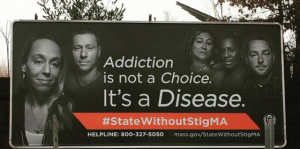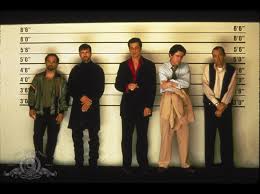It’s been a while since my last post. I did some relaxing, hung out with my kids, but mostly I spent my time writing a long, dense article summarizing my book — an invited article for a journal. I found myself back in the ring, fighting the Disease Model of Addiction… Round 17.
 Is this some imaginary nemesis? Am I some demented Batman doing battle with hidden enemies? My dear cousin, Karen, who’s given me advice on all matters of personal deportment, diplomacy, table manners, and proper toilet practices since the age of three (she even instructed me to wipe after peeing, which turned out not to be necessary for boys) …Karen tells me to put down my slingshot. Goliath is more imaginary than real, and I should try to be nice and get along with others.
Is this some imaginary nemesis? Am I some demented Batman doing battle with hidden enemies? My dear cousin, Karen, who’s given me advice on all matters of personal deportment, diplomacy, table manners, and proper toilet practices since the age of three (she even instructed me to wipe after peeing, which turned out not to be necessary for boys) …Karen tells me to put down my slingshot. Goliath is more imaginary than real, and I should try to be nice and get along with others.
And then my knowledgeable email buddy, Sally Satel, sends me an issue of the New England Journal of Medicine, published only last month, in which the disease model is centre stage once again. The title of the article is…
Neurobiologic Advances from the Brain Disease Model of Addiction
The second sentence says it all: “In the past two decades, research has increasingly supported the view that addiction is a disease of the brain.” Nothing new there. In a nutshell…
Addiction is a chronic, relapsing brain disease, evidenced by changes in the brain, especially alterations in the striatum (the brain part that underlies goal-seeking) and in the prefrontal cortex (responsible for cognitive control). These regions become partially disconnected with ongoing drug use. (my summary)
The argument hasn’t changed in years. (For a detailed account, read my book.) But the next sentence takes a new tack: “Although the brain disease model of addiction has yielded effective preventive measures, treatment interventions, and public health policies to address substance-use disorders, the underlying concept of substance abuse as a brain disease continues to be questioned…”
 Indeed it does, more and more, and the appendix to the article spells out some of the criticisms leveled by writers such as Maia Szalavitz, Carl Hart, Sally Satel, Bruce Alexander, our cantankerous and relentless Stanton Peele, and yours truly. (Gabor Maté and Johann Hari will agree if you ask them.)
Indeed it does, more and more, and the appendix to the article spells out some of the criticisms leveled by writers such as Maia Szalavitz, Carl Hart, Sally Satel, Bruce Alexander, our cantankerous and relentless Stanton Peele, and yours truly. (Gabor Maté and Johann Hari will agree if you ask them.)
As you might expect, the appendix also includes a brief counter-argument posed against each of these criticism. Here I’m going to review just two of these arguments/counterarguments and tell you why I think we should keep the slingshot loaded.
“1. Most people with addiction recover without treatment, which is hard to reconcile
with the concept of addiction as a chronic disease. This reflects the fact that the
severity of addiction varies, which is clinically significant for it will determine the type
and intensity of the intervention. Individuals with a mild to moderate substance use
disorder, which corresponds to the majority of cases, might benefit from a brief
intervention or recover without treatment whereas most individuals with a severe
disorder will require specialized treatment.”
So are they saying that most people with addictions don’t have a disease, and only those with severe addictions do? But you wouldn’t say that people with mild cases of cancer, pneumonia, tuberculosis, malaria, or even diabetes don’t have the disease. You’d say they do have the disease but it’s not too  bad…yet. So maybe they’re saying that most people with a mild to moderate level of the brain disease of addiction don’t need intensive treatment? That might make sense, except that it doesn’t. This majority of addicts start using more than they should for a few months or even a few years, and then most of them just stop, without treatment. (The statistics on that are indisputable, so it’s good that the disease folks are finally acknowledging it.) But that doesn’t sound like a disease at all. It sounds like a bad habit that most people recognize is unhealthy and learn how to control. Then is there a threshold at which addiction goes from an overlearned habit to a disease? If there were, it would be measurable. But no one has ever succeeded in measuring it. Few would even try.
bad…yet. So maybe they’re saying that most people with a mild to moderate level of the brain disease of addiction don’t need intensive treatment? That might make sense, except that it doesn’t. This majority of addicts start using more than they should for a few months or even a few years, and then most of them just stop, without treatment. (The statistics on that are indisputable, so it’s good that the disease folks are finally acknowledging it.) But that doesn’t sound like a disease at all. It sounds like a bad habit that most people recognize is unhealthy and learn how to control. Then is there a threshold at which addiction goes from an overlearned habit to a disease? If there were, it would be measurable. But no one has ever succeeded in measuring it. Few would even try.
“3. Gene alleles associated with addiction only weakly predict risk for addiction, which
is hard to reconcile with the importance of genetic vulnerabilities in the Brain Disease
Model of Addiction. This phenomenon is typical of complex medical diseases with high
heritability rates for which risk alleles predict only a very small percentage of variance in
contrast to a much greater influence of environmental factors (i.e., cirrhosis, diabetes,
asthma, cardiovascular disease). This reflects, among other things, that the risk alleles
mediate the response to the environment; in the case of addiction, the exposures to drugs and stressful environments.”
My last post covered the genetics issue in some detail (and I’ll get back to it in a later post). But here’s the crux of the issue. Yes, weak genetic predictors may be typical of many diseases with high heritability. But they’re also typical of a bunch of other stuff…like personality! Personality outcomes  fall into distinct categories: extrovert, anxious-neurotic, sociable, suspicious, dependent, etc, etc. (Should we add “addict” to the list?) And all of these “types” have weak genetic predictors (though high concordance between, say, identical twins). The reason is because people become the way they become based on what happens to them in life — the environment shapes them while they shape their environment. So the whole “genetics issue” — which has been a holy cow for disease model
fall into distinct categories: extrovert, anxious-neurotic, sociable, suspicious, dependent, etc, etc. (Should we add “addict” to the list?) And all of these “types” have weak genetic predictors (though high concordance between, say, identical twins). The reason is because people become the way they become based on what happens to them in life — the environment shapes them while they shape their environment. So the whole “genetics issue” — which has been a holy cow for disease model  advocates — ends up saying nothing at all about whether addiction is a disease.
advocates — ends up saying nothing at all about whether addiction is a disease.
I’ll end by saying that holy cows get my goat (that actually means something in American). Next post, I’m going to tell you why I think it’s so hard (though it would be nice, Karen) to actually reconcile the disease and learning models of addiction.

Leave a Reply